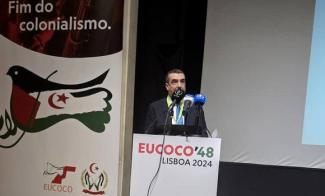
Lisbon (Portugal), 30 November 2024 (SPS) - The speaker of the Algerian Council of the Nation (upper house of Parliament), Salah Goudjil, said Friday that the decision of the Court of Justice of the European Union (CJEU) represented a new international recognition of the righteousness of Western Sahara cause and explicit confirmation that the Moroccan presence in the region is colonisation.
In a speech at the 48th European Conference of Support and Solidarity with the Sahrawi People (EUCOCO) held in Lisbon, read on his behalf by Mohamed Reda Ousahla, the deputy speaker of the Council of the Nation, Goudjil said "we welcome with optimism the new victories achieved through the efforts of free men and women worldwide, including the European Coordination of Committees in Solidarity with the Sahrawi People."
These victories, he added, "include the ruling by the Court of Justice of the European Union invalidating agreements between the European Union and the occupying state."
"The decision by the Court of Justice of the European Union represents a new international recognition of the righteousness of the Sahrawi cause and an explicit confirmation that Morocco’s presence in the region constitutes colonization," the speaker of the upper house of Parliament stressed.
"It calls for the protection of the rights of the occupied people against violations and exploitation."
Goudjil underlined the need to "continue our efforts to ensure that international laws guarantee Sahrawi people's right to self-determination and independence," explaining that "the ruling of the European Union’s Court of Justice affirming the illegality of any Moroccan sovereignty over Western Sahara, combined with the judgment of the International Court of Justice in The Hague which affirmed that there is no historical or geographical link between Western Sahara and Morocco, underscores that the continuation of colonization in this region is an affront to international justice and its credibility."
"These rulings place the United Nations Security Council once again before its responsibilities."
In his speech, Goudjil emphasized the "the sanctity of our role as parliamentarians."
This role, he said, "also involves striving for the enforcement of international laws, whose violations come at a great cost to peoples."
"This parliamentary gathering within the framework of the European Coordination of Committees in Solidarity reflects our awareness of this responsibility. It also reaffirms our determination to continue our unwavering support for the rights of oppressed peoples and to contribute, through all available diplomatic mechanisms, to the successful completion of the decolonization process in Africa."
"The international community has, whether explicitly or implicitly, unanimously recognized the legitimacy of the Sahrawi cause. Its organizations, led by the United Nations, have affirmed that this is a matter of decolonization, and it is treated as such, except by the occupying Moroccan regime, which persists in its delusion of the so-called 'territorial integrity.' It relies on the support of colonial powers, past and present, that back its expansionist thesis in exchange for questionable trade agreements, wherein the occupying state, Morocco, exploits resources that do not belong to it," the speaker of the Council of the Nation said.
He then stressed that "through its non-permanent membership in this Council, Algeria continues its efforts in order to reach this aim under the leadership of President Abdelmadjid Tebboune, who prioritizes African issues, particularly decolonization, during Algeria's mandate."
Goudjil commended the choice of the Portuguese Republic to "host the 48th session of the European Coordination of Committees in Solidarity with the Sahraoui People. This session coincides with the 50th anniversary of Portugal’s 'Carnation Revolution,' which led to the independence of several African countries."
"Algeria is proud to have supported this revolution, welcomed its leaders, and hosted the meeting where the independence agreements of former Portuguese colonies were signed."
The speaker said "Algeria’s support for the Portuguese people in their struggle against dictatorship, which put an end to a painful colonial era, and its unwavering support for liberation movements in Africa reflect the principles of its glorious Revolution and its unwavering historical commitment, which it upholds without exception or compromise, reaffirming support for colonized peoples everywhere in the world."
He emphasized the suffering of the Palestinian people "who are facing extermination at the hands of a Zionist colonial occupation," reiterating "Algeria's solidarity with these resilient people and our unconditional support for their legitimate rights to resistance and independence."